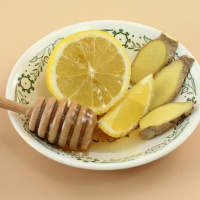
Jakarta, cough can be caused by various causes such as respiratory infections, influenza, allergies, asthma, choking or inhaling cigarette smoke. There are different kinds of cough medicines on the market, but actually cough medicines are also widely available in your kitchen.
"Almost everyone has a cough, as coughing is actually the body's physiological reflex to remove foreign objects from the throat. Therefore, not all the cough must be cured, because it's a reflex," said Prof.. Dr. Sumali Wiryowidagdo, Apt, Vice Chairman of the Center for Natural Products Drug Studies Department of Pharmacy, University of Indonesia in the event FMIPA Media Workshop on 'Innovation Technology Materials Extraction Natural Herbs Produce an Effective Cough' in Flower Goela Resto, Central Plaza, Jakarta, Thursday (16 / 6 / 2011).
Prof. Sumali also said that not a disease but merely symptoms. Some types of cough medicines are commonly used include:
1. Antitussive (cough)
2. Anti allergy (antihistamines)
3. Decongestan (thinning phlegm)
4. Antibiotics
5. Analgesic
6. Anti-inflammatory
7. Avoid smoking and secondhand smoke
8. Avoid allergens (dust and cigarette smoke)
"But the truth is in our own homes many herbal remedies that are used as cough medicine, usually a lot in the kitchen," continued Prof. Sumali who is also a Professor at the Faculty of Pharmacy FMIPA UI.
Based on much research has been done, Prof. Sumali give some examples of herbs that can be used as a cough medicine, namely:
1. Ginger rhizome (Zingiber officinale Roscoe) and red ginger (Z. officinale var. Rubra)
"Ginger efficacious as karminativa (eliminating bloating, antiinflammatory, analgesic (pain due to cough), antipyretic (fever). Ginger is efficacious as a cough medicine as a component of essential oils containing terpenoids zingiberol, gingerol and shogaol. The trick boiled or brewed with hot water and then drunk, "explained Prof. Sumali.
2. Rhizome kencur (Kaempferia galanga L.)
"If I kencur washed, peeled and chewed, it can be a cough medicine," explained Prof. Sumali.
According to Prof. Sumali, kencur efficacious as anti-inflammatory and pain control, antihypertensives, influenza drugs. These herbs are efficacious as 2.4 to 3.9% volatile oil which contains 25-30% etilsinamat and methyl-p-methoxy-cinnamic acid, trans-cinnamic.
3. Extracts of lime (Citrus aurantifolia Swingle)
"Orange juice can be used to cure influenza, mules stomach, nausea, coughing. Orange juice contains the chemical components of essential oils containing 7%
terpenes, terpenoids tangeritin hesperidin, naringin, eriocitrin, eriocitrocide.
4. Seed oil extract and nutmeg (Myristica fragrans Houtt)
"The seeds contain a chemical component miristisin nutmeg, myristic acid, safrol and
eugenol. Usefulness as sedativa (tranquilizers), so people who usually eat food containing nutmeg so sleepy, "continued Prof. Sumali.
5. Mint or peppermint oil (Mentha piperita L)
"The leaves have asked for as a stimulant properties (stimulates appetite), karminativa (digestive relief), antispasmodic (to relieve muscle tension and respiratory tract), antiemetic (anti-vomiting).
The main component of peppermint oil is menthol 50-60%, 40-45% is menthol-free, the other in the form of esters.
6. Liquorice or licorice or licorice (Glycyrrhiza glabra L.)
"The roots of sweet already known to have a broad spectrum of pharmacological properties since 2100 BC. Liquorice widely used in cough formulas as ekspektoransia and demulcent (mucoprotective), anti-inflammatory," explained Prof. Sumali.
Chemical components contained therein is glycyrrhizin, potassium and calcium salts glisirisinat acid. Flavonoids liquiritin, isoliquertin, liquiritigenin, isoliquiritigenin, ramnoliquiritin.
7. Thymi Herba (Thymus vulgaris and T. zygis)
Usefulness as an antiseptic, antitusiv, spasmolitik and ekspektoransia. With the chemical components of volatile oil containing not less than 1.2% with a phenol content of not less than 0.5% calculated as thymol.
Tidak ada komentar:
Posting Komentar